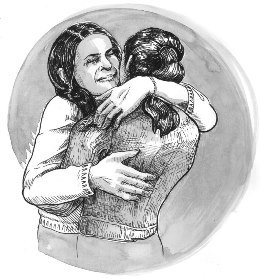It takes a long time to recover from a relationship where you are emotionally abused and dominated.
Below are suggestions for people who have left a relationship of coercive control. If you are still in such a relationship, I recommend you seek help from a domestic violence advocate. Even if there is no physical violence in your relationship, the advocate will help you assess your situation, access resources, and stay safe, whether you decide to stay in or leave the relationship. I've organized these suggestions under the acronym RECOVERY.
•Reclaim activities that the controlling person kept you from doing. For instance, Sharon's partner did not want her to go running. After separating, she felt a wave of liberation every time she laced up her running shoes. Cynthia's husband did not want her to wear makeup. She asked a friend to help her choose lipstick and eyeliner and gradually began wearing these again.
•Embody. Reconnect with your body by becoming physically active and eating well. In a controlling relationship, many people become alienated from their physical selves. Try something you've enjoyed in the past, or experiment with a new activity. Walking, yoga, dancing, lifting weights, bopping to the radio while you cook -- these can all help you feel your vitality again.
•Connect with family and friends from whom you were isolated. Stick with it through the first awkward conversations. (Be cautious, however, about contacting former romantic partners too soon). Counseling can help you understand your position and face the challenges ahead. A good therapist will help you feel less alone, and will help you improve your relationships with other people. Make sure your therapist understands the concept of coercive control -- it's still a new idea.
•Organize your time and physical space. It's easy to feel overwhelmed when a relationship ends. Try to establish a routine. If you have clothes, books, furniture, and other items from the controlling relationship, you may want to sell them or give them away. Many communities have survival centers where you can pick up items you need at no cost and leave things you no longer want. With each item you replace, you'll feel freer.
•Verbalize. Share your story, when and how it feels right to you. Start by keeping a diary where you can be honest with yourself. Speak with selected friends and family who you know will support you. Telling your story may help you cope with your feelings, and may also have positive practical effects. For instance, if your boss understands the situation, your ex-partner may not be able to cause so much trouble for you at work.
•Express yourself creatively. Do you like to dance? Write? Draw? Garden? Sing? Many victims shut down creatively during the coercive control relationship, busily attending to their partner's demands. Leaving a controlling relationship might help release your artistic side once again.
•Remember. Over time, build a list of the controlling incidents that you experienced. You can refer to it later when you doubt your memories or your interpretation of events. The list will help you appreciate what you've been through, and realize how strong you are. Also, make a list of your strengths. Take pride in the courage you showed, and look forward to a full life as a free person.
•You. Put yourself at the center of your life. You may hear the abuser's voice in your head, telling you that you can't do anything right, you are stupid or ugly, or whatever else he told you. Replace that voice with a kind one. Identify your own thoughts and feelings. Ask yourself what you want. Do things that bring you pleasure and that are good for you.
It is natural to feel regret from time to time, but try to look ahead and not behind. Separate yourself as much as possible from the controlling person and from anyone who interacts with him, so you cannot be controlled or monitored through someone else. (Of course, this is more difficult and will take a different kind of planning if you share young children). You can look forward to a fulfilling life after ending your coercive control relationship. Recovery does not happen overnight, but it happens.
Need help? In the U.S., call 1-800-799-SAFE (7233) for the National Domestic Violence Hotline.
